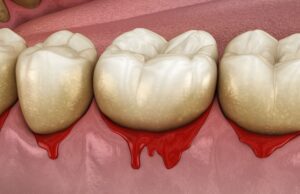A study in the Journal of Clinical Periodontology suggests that people with gum disease could have a higher risk of severe complications related to COVID-19 than those who do not have this infection. This stems from the link between inflamed gums and the body’s inflammatory response.
This connection shows that protecting the health of your gums is more vital now than ever. You should keep seeing your dentist for routine dental check-ups to keep your gums healthy and free from infection. Read on to learn more about the importance of treating periodontal concerns as soon as possible.

Can I Tell If I Have Gum Disease?
The early stage of gum disease, gingivitis, often presents with noticeable symptoms. These patients may see bleeding, soreness, and puffiness in their gums. These issues can occur for acute reasons like harsh teeth brushing. But if they persist, you should let your dentist know about your concerns.
Not every person will have these visible symptoms, but the infection to the gum tissue may still be present. This is why you should visit your dentist for routine exams. They will conduct a periodontal screening to check you for gum disease.
This way, your dentist can diagnose gum disease promptly and provide treatment right away. Gum disease does not go away on its own, and it is easier to treat the earlier it is spotted. Even if you do not realize you have an infection in your gums, a dentist will.
You should get treatment for gum disease as soon as you can because the infection will spread and impact the tooth root and jawbone. This will deteriorate these parts of the mouth and cause irreversible damage, such as tooth loss.
What Treatment Will My Dentist Use to Heal My Gums?
If your dentist finds that you have gum disease, they will begin treating the problem right away. They begin by thoroughly cleaning your teeth and gums of excess bacteria and plaque. They scrape away these residues in hard-to-reach spots of the mouth, especially near the gumline. This cleaning method is known as scaling and root planing.
If the infection persists after this periodontal therapy, your dentist may employ laser dental techniques to target the infection and remove the damaged gum tissue. This treatment provides minimally invasive, safe, and precise attention to stop the infection from worsening. If you need to restore structure to your gums after this treatment, your dentist may give you a gum graft.
Your dentist may recommend at-home treatment as well, such as an antibacterial rinse. This mouthwash will balance bacteria in your mouth to alleviate uncomfortable inflammation. It will also lower the risk of oral infections like gum disease in the first place to reduce the chances of recurrence.
Good oral hygiene can prevent plaque and bacteria from spreading and leading to this gum infection. However, some patients are more prone to this issue. You can discuss preventative measures to protect your smile when you schedule a consultation with your dentist.
